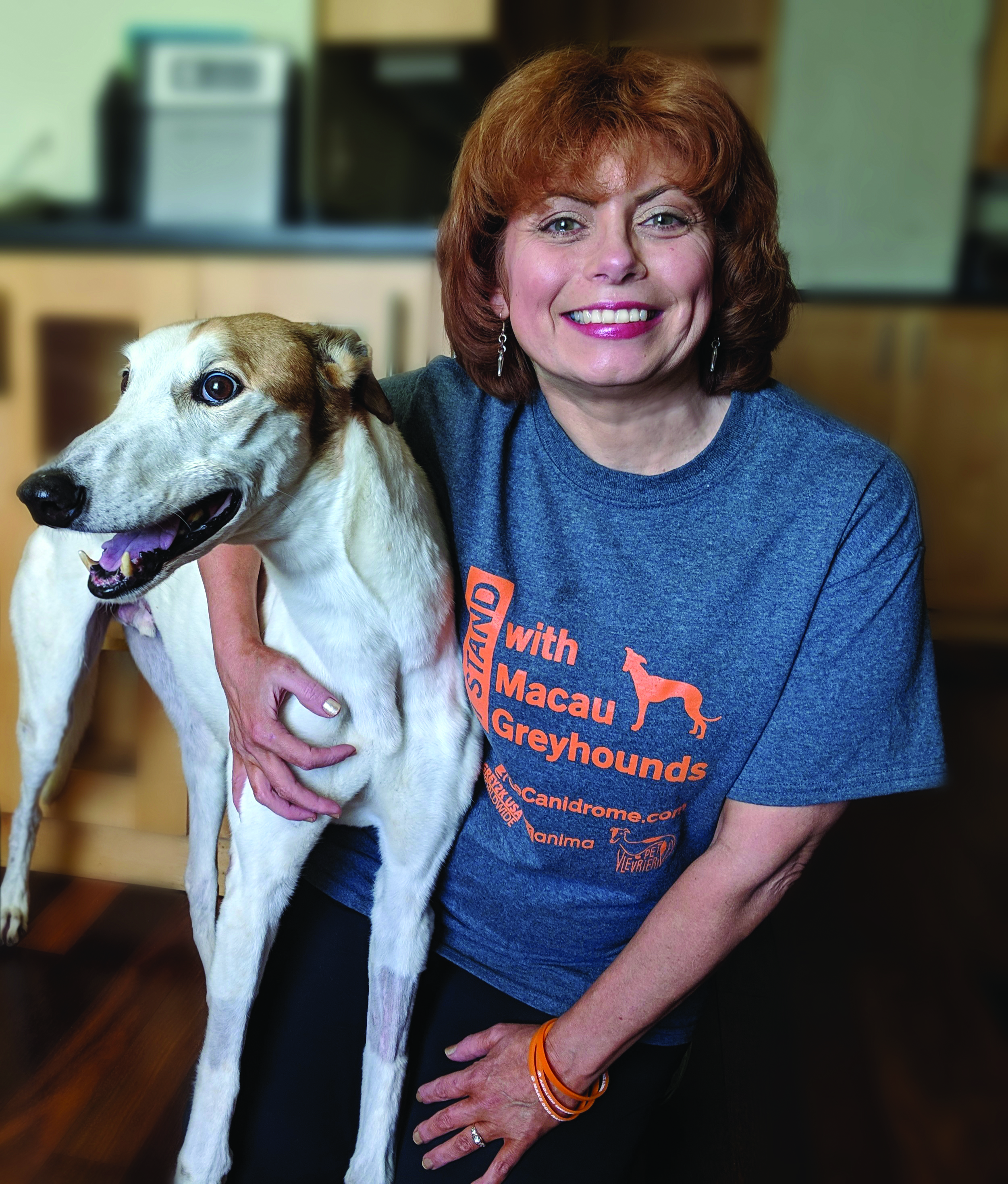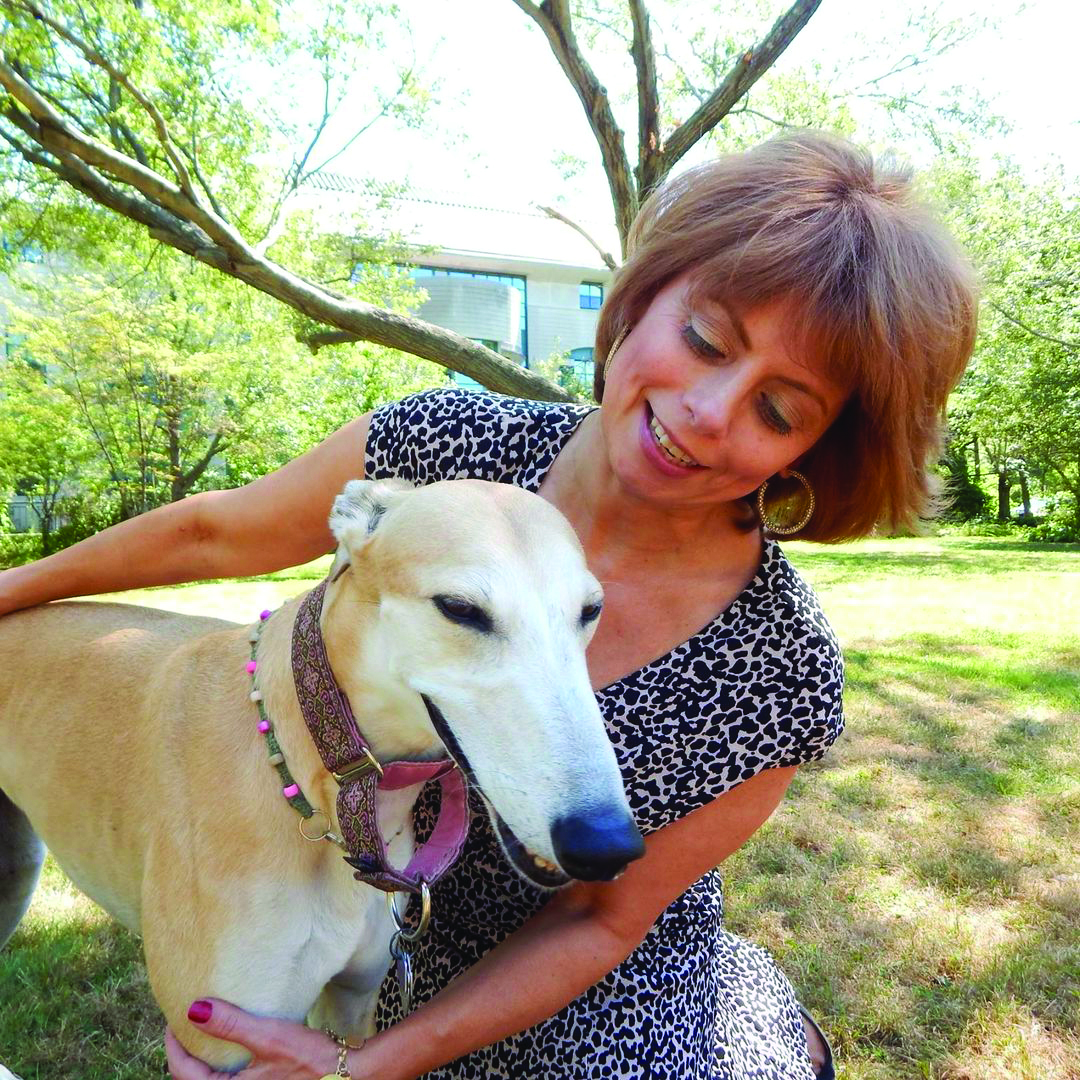A love for canines influenced this lawyer's work to outlaw greyhound racing

Christine A. Dorchak, pictured with Brooklyn, has devoted her professional life to helping greyhounds. Photo courtesy of Christine A. Dorchak.
People often ask me how I came to become a lawyer for greyhounds. In fact, the dogs led me to law school.
Racing greyhounds are kept in warehouse-style kennels, inside small stacked cages for up to 23 hours a day. When they are let out to race, they suffer injuries, and many die. They break their necks, their backs and their legs, suffer heart attacks and become paralyzed—just so gamblers can place a $2 bet. I knew this was no way to treat a dog and that the law should be changed.
All of my life I have been a problem-solver, so when I learned that thousands of dogs were suffering and dying at two dog tracks in my own backyard, I had to do something about it.
“How could such a clear exploitation of man’s best friend be legal?” I wondered. I started at New England Law | Boston in 2001, the same year I co-founded a nonprofit greyhound protection group, GREY2K USA, with my partner, Carey Theil. I attended classes at night and worked for dogs by day.
My decision to attend law school was also influenced by a being struck by a Boston trolley while walking my dog Kelsey. She was a 1-year-old black Russian terrier I had adopted on her last day at a kill shelter. Just as I had saved her life, she pulled me away from the direct path of the train and spared me from certain death. We both suffered injuries and spent years in recovery. I promised that if I should ever be able to walk and talk and care for myself again, I would spend my life helping dogs.
I was the New England Scholar for my class, which included a full scholarship. On the eve of graduation, I learned that George Carney, a local dog track owner, funded the scholarship. When I thanked him, he insisted on coming up on stage to personally hand me my diploma. Perhaps he thought I would be out of his hair, toiling away at a big law firm downtown for the foreseeable future. Instead, I spent the summer writing the ballot question that was approved by Massachusetts voters and led to the state’s Greyhound Protection Act, which gradually eliminated commercial dog racing by 2010.
That opened the door for change nationwide, and since then we’ve successfully campaigned to close down nearly 50 tracks in the U.S. Today there are only two, both in West Virginia.
 Christine A. Dorchak and her dog Gina. Photo courtesey of Christina A. Dorchak.
Christine A. Dorchak and her dog Gina. Photo courtesey of Christina A. Dorchak.My organization also worked with officials in Beijing to rescind the license of the only legal dog track in China. We airlifted more than 500 dogs to safety, including my own dog, Brooklyn. There was no adoption program at the track, and prior to our #CloseTheCanidrome initiative, every dog who raced there died there. That was about 400 dogs a year. When Brooklyn came off the plane, he was underweight, his coat was dull and dirty, and he had large sores on his legs. Thirteen teeth, worn down to the roots after years of chewing on the bars of his cage, had to be removed. Brooklyn’s personal story of survival and the way he joyfully greeted each new day taught me to treasure my time on this earth more than ever before.
My book, co-authored with Carey, Brooklyn Goes Home: The Rise and Fall of American Greyhound Racing and the Dog that Inspired a Movement tells the story of our 25-year campaign to end dog racing, which has helped save 50,000 greyhounds to date and culminated in the recent filing of the Greyhound Protection Act in Congress. Our memoir is written for anyone who has ever loved and lost a dog, but it’s also a political and legal how-to. We describe our state-by-state push to outlaw dog racing and introduce readers to the diverse group of people who came together to help greyhounds along the way. These folks—Democrat and Republican, old and young—were united in the singular belief that dogs are family friends and not racing machines.
It is my hope that readers, both lawyers and nonlawyers, find inspiration in our story and discover new paths to making positive change in the world.
This story was originally published in the April-May 2024 issue of the ABA Journal under the headline: “Leaving the Cage: A love for canines influenced this lawyer’s work to outlaw greyhound racing”
A co-founder of GREY2K USA Worldwide, Christine A. Dorchak has extensive professional experience in the animal protection movement. She specializes in pari-mutuel law and has drafted laws to prohibit dog racing in several states and countries.
This column reflects the opinions of the author and not necessarily the views of the ABA Journal—or the American Bar Association.



